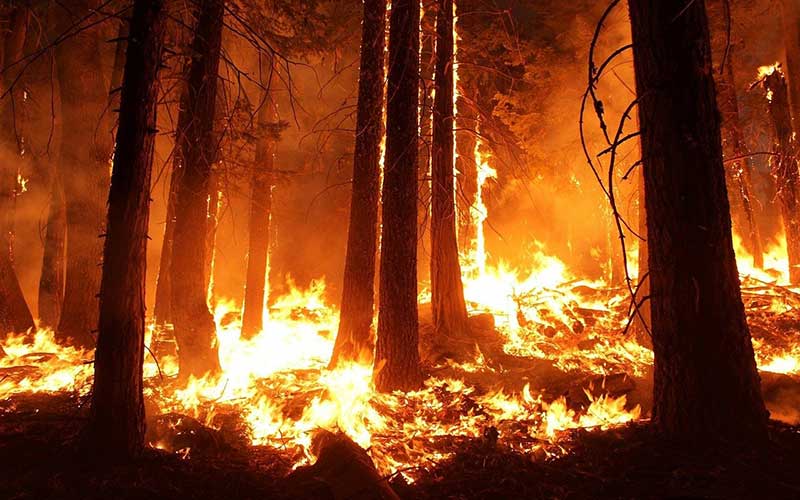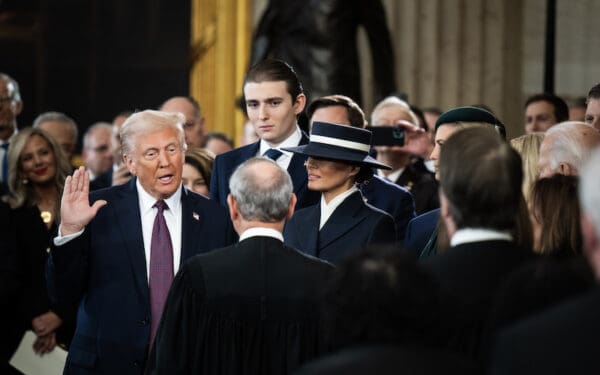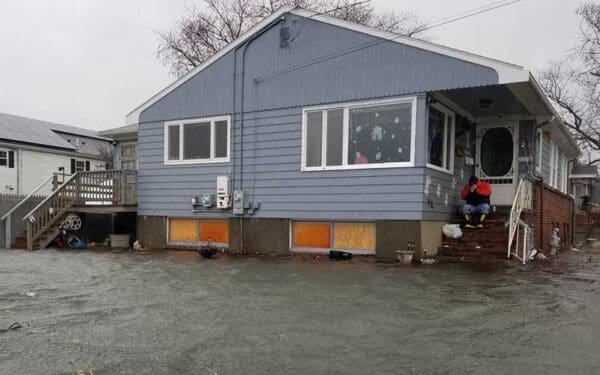
This year's wildfire season in California was a literal nightmare for many. Photo: Pixabay
As a kid, the scariest place to trick-or-treat was the big house three blocks over. It loomed at the end of a long, dark driveway. We imagined the lawn filled with hideous “monsters” ready to leap out and frighten us away. But if we braved that gauntlet of ghouls, a thrilling reward awaited us: king-sized candy bars that were the highlight of our entire nighttime haul.
With Halloween here, I’m thinking about that driveway again. But it’s no longer axe-wielding clowns or cursed mummies that send a shiver down my spine.
The scariest monster I can conjure now wears a tailored suit and sits behind the desk of a dirty oil or gas company deliberately blocking climate action. Runner up is another man in a suit – a legislator too scared to stand up to that fossil fuel executive and protect the people who voted him into office. What frightens me most is to think about what happens if we let these executives – who’ve made billions by polluting our air, water, and climate – continue their destructive work.
But this Halloween, I’d like us all to face the monsters arrayed in front of us – and to see that the “monsters” holding us hostage to dirty energy are just people, and we have the power to defeat them.
If We Don’t Take Action Now, Climate Impacts Will Get Even Worse
Climate change is already impacting New England – and the entire country – in devastating ways. Uncontained wildfires raze towns across the West Coast while hurricanes in the South have become so frequent that we’re running out of letters to name them. Closer to home, the Gulf of Maine is warming fast – threatening the fishing industry. More frequent and severe storms batter the coast and leave inland neighborhoods flooded with rain. Heat waves are growing more frequent and intense, harming people’s health and worsening droughts. It’s a terrifying picture of a new normal defined by compounding disasters and tougher day-to-day living.
Critically, these impacts are felt first and worst by the communities least able to bounce back. Environmental justice communities have long been the sacrifice zones for their whiter, wealthier neighbors. Dirty power plants and waste incinerators are more likely to be built in their backyards, and highways run closest to their streets. This is true in New England and throughout the world.
We knew these impacts were coming. Scientists hired by the fossil fuel companies themselves predicted as much over 40 years ago. Experts now expect even worse to come if we don’t take action.
Fossil Fuels are Zombies. As in, They’re Trying to Kill Us
We know that fossil fuels cause climate change. They’ve already lived past their death knell – and we have clean solutions ready to replace them. We need to stop using these dangerous, dirty fuels no later 2030, and after that, we need to keep them buried in the ground where they can’t do us more harm.
Our largest sources of dirty emissions are electricity and transportation – how we power our lives and get ourselves and our goods from place to place. To generate power, we can set aside fossil fuels and use solar and wind energy instead. And we can use this same clean power to run our cars, trucks, and buses. Why would we continue using fossil fuels when we know they’re actively killing us?
Getting off coal, oil, and gas in favor of clean energy like solar and wind, and reimagining transportation in the process, is completely achievable. We can, and must, make this transition in a way that benefits everyone, putting people to work and leaving no communities behind.
The only thing standing in the way are the fossil fuel executives and their lobbyists, who, due to their own shortsightedness and deceit, now risk lower profits should our economy turn to clean energy. These modern-day monsters – whose goal is to keep us dependent on their deadly products – have certain legislators scared. We can’t let this continue.
Coordinated Local Action Can Help Us Solve Climate Change
To build a zombie-free future, we need action at every level. In particular, local governments can step up to facilitate solutions that we already know work. Passing strong climate laws to lower emissions by a certain date, pushing our utilities to change their business models and get off fossil fuels, and reinventing how people move through cities and around rural areas – these are just some of the ways we can transform our economy and curb climate change.
We also must codify language into law to uplift and give agency to historically marginalized groups. The low-income, Black, and immigrant communities that have been left behind by city planning and progress must have a say in what happens in their own neighborhoods – and equal access to climate solutions like clean transportation. Rural communities also deserve the same attention as cities, because our path to a cleaner future is not complete without them.
With Washington bogged down in infighting and inaction, we can all take the lead through meaningful action at the local level.
That means we must hold our local leaders accountable to climate action. Where enforceable climate laws are in place – like Massachusetts, Connecticut, Maine, and Vermont – we must ensure they’re being followed and that climate-damaging emissions are going down. Where governors have pledged action, such as in Rhode Island, we must speak up and demand real progress towards these clean energy goals. No leader can continue to kick this can down the road.
It will take coordinated, sustained effort to transform our economy into one run on clean, renewable energy. It will also take bravery to run the gauntlet of suited industry executives intent on keeping the status quo.
But this work is not only an investment in our climate, it’s an investment in our future – in jobs and public health and community resilience. The reward of a better future for ourselves, our children, and our grandchildren, is worth it.
Sign up for CLF emails to stay on top of the latest.



